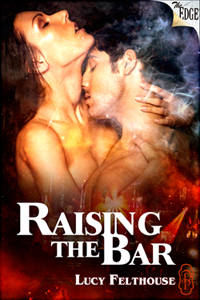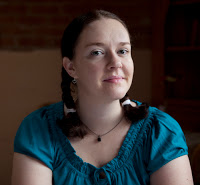By Lisabet Sarai
As erotic romance becomes increasingly
popular, I’ve noticed a trend among authors of erotica to denigrate
the genre. ER panders to readers who aren’t comfortable with “real”
erotica, some argue, sanitizing sex by requiring that the individuals
doing the nasty be “in love”. ER is tame and conservative,
according to others, not to mention stereotyped. True creativity
isn’t possible within the rigid constraints of the genre. ER
reinforces traditional cultural mores which favor monogamous,
committed relationships, especially those in which the woman is
subservient to the man, the social critics complain. The happy
endings required by romance just aren’t realistic, runs another
popular objection, and they make romance too predictable.
Recently a well-known erotica author
reviewed one of my novels on Goodreads. She commented that she would
have given it five stars, but she dropped her rating to four because
the book was too “romancey”. This is for a novel in which the
heroine is boffing three different men, as well as a spare woman or
two…!
There’s a kernel of truth in all of the
arguments above. I’ve read blog posts by authors of erotic romance
who loudly protest that what they write is distinct from “erotica”
(or “porn”) because they’re focusing on characters and
relationships instead of “just sex”. It may be that these
individuals have never encountered well-crafted erotica, but the
stridency of their tone suggests a level of fear or repulsion
associated with sexuality. (Or maybe they’re just afraid of the
social stigma attached to being overtly sexual.)
Some erotic romance is indeed tame and
conventional, by my standards at least, focusing as it does on
vanilla sex initiated mostly by the male. On the other hand, some
folks enjoy vanilla erotica, too. And yes, I get annoyed with
romances where marriage seems to be the ultimate goal in life, but
these days there are plenty of ER stories where matrimony is never
mentioned.
Predictability is a huge
challenge for a romance author. In some ways, the HEA or HFN required
makes crafting a romance more difficult than producing a tale
construed as erotica, which is free to end ambiguously or even badly
for the characters. Romance readers know, at some level, that
everything will work out. It takes consummate skill to create
narrative conflicts so compelling that readers will wonder just how a
happy ending could be possible. It’s tough, but it can be done.
Erastes’ M/M romance Standish sticks in my mind as a tour
de force in this regard. Twenty pages from the end, I couldn’t
imagine how the protagonists could ever reconcile, yet when they did,
I found the resolution completely believable.
A lot of the romance I read is boring –
poorly crafted, with amateurish language, hackneyed premises,
cardboard characters and implausible or sometimes non-existent plots.
However, there’s plenty of awful erotica out there, too. Those of us
who hang out at ERWA don’t tend to see it as much, but spend a little
while browsing the self-styled “erotica” on Amazon if you don’t
believe me. The explosion of e-publishing and self-publishing has
resulted in a flood of terrible books in pretty much every genre.
There are probably more of them labeled romance than anything else,
simply because romance is the single most popular category of books.
I write for both audiences. Based on
comments I’ve seen on the ERWA Writers list, I think some erotica
authors harbor some serious misconceptions about erotic romance.
Romance has changed – a lot. For a
great discussion of romance then versus now, check out Sheila
Claydon’s recent post at Beyond Romance
(http://lisabetsarai.blogspot.com/2013/07/metrosexy.html).
No longer are heroines wimpy and helpless, just waiting to be saved
by the big, blustery alpha male. They’re not shy or reluctant about
sex anymore, either, worried about preserving their virginity or
hankering to make a good marriage. The
more realistic HFN (happy for now) is a perfectly acceptable
alternative to happily ever after.
Today’s erotic romance celebrates
sexual pleasure every bit as enthusiastically as erotica, and
includes many of the same activities – oral sex, anal sex, group
sex, exhibitionism and voyeurism, sex toys, bondage, discipline,
whipping, spanking, piercing, branding, knife play. You’ll find
casual sex in romance too, though the participants usually end up in
a more enduring relationship as opposed to simply going their own
satisfied ways afterward. And of course, these days romance doesn’t
have to be straight. Gay ménage
is very popular, as is bisexual (M/M/F) ménage.
The market for lesbian romance appears to be smaller, but still energetic and loyal.
Am I
trying to argue that there’s no difference between erotica and erotic
romance? Of course not. However, the dividing line isn’t sharply
defined either. Several of my own novels, originally written as
erotica, are now being sold as erotic romance. Indeed the erotica
versus erotic romance dichotomy may be more a question of different
target markets than clearly different content (at least in the
aggregate).
Meanwhile,
I believe that the popularity of romance has benefits for erotica.
Erotic romance has helped readers become comfortable with stories
about sex and has aroused their curiosity about more extreme or novel
activities. Of course the publication of FSOG has accelerated this
trend, but the drift in readers from pure erotic romance toward
erotica has been going on for quite a while.
Erotica
sales lag romance, but they’ve still grown phenomenally since the
advent of ebooks. I think we’re seeing significant spillover. When
romance readers want a bit “more” – more extremes of emotion,
more breaking of taboos, more surprises – they turn to erotica.
Some
of you may be shaking your heads right now. You’re wondering if an
alien has slipped into the skin formerly occupied by Lisabet Sarai,
because this post seems to contradict things I’ve written previously.
It’s true that in the past I have lamented the co-opting of erotica
by erotic romance. It does bother me that publishers like Cleis, who
previously focused on exceptional literary erotica, now targets the
romance reading community with many of their titles. Black Lace
flipped years ago, from “erotica by women, for women” to erotic
romance. Eighty percent of new publishers who want erotic content
also specify that they want a relationship and at least a happy for
now resolution.
I’m
starting to become a bit more comfortable with this development,
however. Publishing is a business. The erotic romance audience is many
times larger than the audience for “pure” erotica. It makes sense
from a financial perspective to give those readers what they want.
I’d much rather have readers introduced to explicit romance via the
quality writing in a Cleis anthology than through some of the
alternatives. And Cleis does still field calls for books with no
romance elements required.
Some
members of our community believe that the ascent of erotic romance is
a dangerous development for erotica – that it is the essence of
erotica to explore the edgy, uncomfortable aspects of sexuality that
might send romance readers screaming and that romance is blunting
those edges. I know I’m going to get some flak for this column from
Remittance Girl and Donna George Storey, for instance. Look, though,
at what these authors are doing in response to the romance boom.
They’re starting their own
presses to publish more transgressive stories. They’re
self-publishing tales that don’t end happily. And they’re finding
readers – perhaps not millions, but more, I contend, than they
would have if erotic romance were less popular.
Which
brings me to a final theory as to why erotica authors tend to diss
romance. We’re jealous. Heck, I admit that I’m jealous, and I
actually publish erotic romance, though my books are apparently too
far from the mainstream to sell zillions of copies. We resent the
fact that our worthy literary endeavors remain obscure while sloppily
written, derivative romance sells. We rail against the fact that the
number of people who want to read happy endings far exceeds those with broader preferences.
That’s
not the fault of the romance genre. And I think we need to get over it, because
bitterness and envy don’t necessarily foster creativity.










